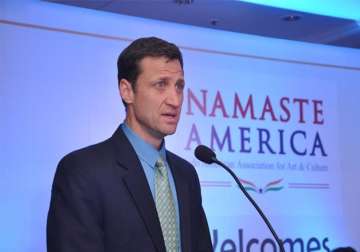It is great time to be in India for American corporates: US diplomat
PANAJI:In the wake of improved ties between India and US, it is a great time for American corporates to be in Asia's third largest economy, a diplomat said today.Earlier, there was a sense of frustration

PANAJI:In the wake of improved ties between India and US, it is a great time for American corporates to be in Asia's third largest economy, a diplomat said today.
Earlier, there was a sense of frustration among the US businessmen about challenges in the Indian market but things have improved after the Modi government expressed commitment to boost bilateral trade and took several initiatives to attract investments, Thomas Vajda, US Consul General in Mumbai, told reporters here.
"The Indo-US relation is on upswing and there is clearly convergence of interest between both the countries. It is a great time to be in India. There was frustration about challenges in the Indian market among the US businessmen but with renewed interests and Prime Minister ( Narendra Modi)'s commitment they are getting offset," he said.
In the past, there were challenges in terms of regulatory mechanism, licencing, intellectual property rights, taxation and amount of ownership that US companies can have in India, Vajda said.
"In New Delhi, our two leaders displayed a unique personal rapport, which is indicative of an increasing convergence of interests between our two democracies.
"As evidence of this convergence, the President and Prime Minister announced breakthroughs in several important areas of bilateral cooperation.
"They worked through key points that have impeded greater civilian nuclear cooperation. They renewed the framework for the US-India defence relationship and committed to taking our trade and investment relationship beyond USD 100 billion per year," the Consul General said.
These cooperative steps represent the possibilities of a new moment in the US-India relations. But the President's visit didn't solve all of our policy differences and there is still work to be done on intellectual property rights protection, market access and creating a more transparent regulatory environment, Vajda said.
property rights protection, market access and creating a more transparent regulatory environment, Vajda said.
In the wake of improved ties between India and US, it is a great time for American corporates to be in Asia's third largest economy, a diplomat said today.
Earlier, there was a sense of frustration among the US businessmen about challenges in the Indian market but things have improved after the Modi government expressed commitment to boost bilateral trade and took several initiatives to attract investments, Thomas Vajda, US Consul General in Mumbai, told reporters here.
"The Indo-US relation is on upswing and there is clearly convergence of interest between both the countries. It is a great time to be in India. There was frustration about challenges in the Indian market among the US businessmen but with renewed interests and Prime Minister ( Narendra Modi)'s commitment they are getting offset," he said.
In the past, there were challenges in terms of regulatory mechanism, licencing, intellectual property rights, taxation and amount of ownership that US companies can have in India, Vajda said.
"In New Delhi, our two leaders displayed a unique personal rapport, which is indicative of an increasing convergence of interests between our two democracies.
"As evidence of this convergence, the President and Prime Minister announced breakthroughs in several important areas of bilateral cooperation.
"They worked through key points that have impeded greater civilian nuclear cooperation. They renewed the framework for the US-India defence relationship and committed to taking our trade and investment relationship beyond USD 100 billion per year," the Consul General said.
These cooperative steps represent the possibilities of a new moment in the US-India relations. But the President's visit didn't solve all of our policy differences and there is still work to be done on intellectual property rights protection, market access and creating a more transparent regulatory environment, Vajda said.
property rights protection, market access and creating a more transparent regulatory environment, Vajda said.